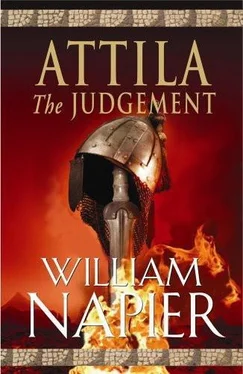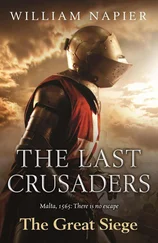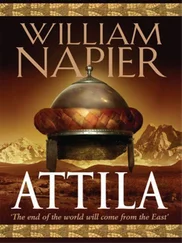William Napier - The Judgement
Здесь есть возможность читать онлайн «William Napier - The Judgement» весь текст электронной книги совершенно бесплатно (целиком полную версию без сокращений). В некоторых случаях можно слушать аудио, скачать через торрент в формате fb2 и присутствует краткое содержание. Жанр: Исторические приключения, на английском языке. Описание произведения, (предисловие) а так же отзывы посетителей доступны на портале библиотеки ЛибКат.
- Название:The Judgement
- Автор:
- Жанр:
- Год:неизвестен
- ISBN:нет данных
- Рейтинг книги:5 / 5. Голосов: 1
-
Избранное:Добавить в избранное
- Отзывы:
-
Ваша оценка:
- 100
- 1
- 2
- 3
- 4
- 5
The Judgement: краткое содержание, описание и аннотация
Предлагаем к чтению аннотацию, описание, краткое содержание или предисловие (зависит от того, что написал сам автор книги «The Judgement»). Если вы не нашли необходимую информацию о книге — напишите в комментариях, мы постараемся отыскать её.
The Judgement — читать онлайн бесплатно полную книгу (весь текст) целиком
Ниже представлен текст книги, разбитый по страницам. Система сохранения места последней прочитанной страницы, позволяет с удобством читать онлайн бесплатно книгу «The Judgement», без необходимости каждый раз заново искать на чём Вы остановились. Поставьте закладку, и сможете в любой момент перейти на страницу, на которой закончили чтение.
Интервал:
Закладка:
Only one thing is more terrible than an approaching army, they said in those days: a retreating army. With all hope and all order gone, left to derive only a bleak satisfaction from wreaking on the weak and defenceless the wholesale destruction that they had failed to wreak on their armed enemies, in sour reprisal for their fate. Even dumb nature suffered, punished by their sullen wrath. Whole late-summer forests were put to the torch, laid waste like tindersticks, entire landscapes left ashen and silent and denuded of life.
Down the roads into Italy and the East, the people came fleeing. See them fleeing, harried by the wind, blown like chaff before the empty wind, puppets dancing to its ancient tragic roar, through the desolate fields. Through the long ages.
Aetius was right to believe that Attila had failed yet would not stop. Destruction had become the very air he breathed. Death had become his life.
Aetius eventually arrived back in Ravenna to face Valentinian’s harshest accusations and demands to know what had become of his army. Aetius told him with exaggerated calmness that there was no Roman army left to speak of. Perhaps they should negotiate with the Visigoths, the only remaining armed force of any significance in Western Europe. Valentinian howled and rent his robes, and bit his tongue till he spat out blood on the white marble floors of the palace.
Then the unbelievable news came to them that Attila was on the march again. He had looped back across Noricum and was riding down towards Aquileia. That he still had the men to fight and, more unbelievably still, the will…
It had all been for nothing. There was none left to oppose him. He would ride into Ravenna, and then Rome, and burn them flat. How many men had he still? All of ten thousand: the tattered remnant of his once mighty army, the rest having either been destroyed upon the Catalaunian Field, or else deserted and vanished back into the vastness of Scythia. But still, ten thousand of the most loyal rode with him – and the Romans had none to oppose him. None. The Visigoths could not be expected to fight for Italy as they had fought for Gaul.
Outside the palace, Aetius told the last of his close guard, ‘You should go now. Take ship for the east. There is no more for you here.’
Arapovian stared hard at him with his coal-black eyes, and at last nodded. ‘I would feel like a deserter,’ he said, ‘except that, as at Viminacium, there is nothing left to desert.’
‘You have served Rome well, Easterner. As well as any.’
Arapovian pulled himself up onto his horse.
‘Where will you go now?’
‘East, as you say. Not to my country – it no longer exists. But east somewhere. Perhaps a long way east. The further the better.’ He kicked his horse into a walk.
‘God go with you, Easterner.’
Arapovian raised his right hand and called back, ‘And with you, Master-General Aetius.’
‘And you, Centurion?’
Tatullus grimaced. ‘I stay. As ever.’
Lastly he went to a simple lodging house and asked to speak to two of the lodgers. Moments later, they appeared at the door. Lucius and Cadoc.
Aetius told them of Attila’s approach. ‘You should sail home now, for good. Forget about Rome, as Rome forgot about you.’
Lucius shook his head. ‘Britain will wait for us. Even I cannot exactly explain why, but we, my son and I, are still needed here, with you. We stay until the end.’
Every night now, Attila suffered visions and broken sleep. He saw his horsemen riding up the steps of the Roman Capitol, gouging out the eyes of emperors’ statues with their spearpoints. In his dreams he ceaselessly called the name of Rome, and of Aetius.
Aquileia offered him no resistance. Rounding up its notables, he demanded to have one Nemesianus brought to him. That venerable senator was old and too weak to move, he was told. But his villa was He galloped away, Orestes barely able to keep pace with him.
He dragged the white-haired old senator out of his bed and out onto the fine terrace looking down upon the great city of Aquileia, and the autumn Adriatic beyond. He waved his drawn dagger over the city.
‘All this,’ he rasped, ‘all this will be destroyed first. Because of you.’
Nemesianus was on all fours, weeping. Orestes halted his horse and dismounted with half a dozen warriors. The senator stared at them – their tattoos, shaven heads, weals, garlands of teeth and jawbones – with sick disbelief. Then he turned back to Attila, almost sobbing, ‘But why me? Why me? ’
Attila squatted down on his haunches and sighed, stropping his dagger on a fine sandstone paving-slab.
‘D-d-don’t, don’t do that,’ stammered Nemesianus. ‘D-d-dalmatian stone, the finest…’
Attila looked at him with arched eyebrows, and laughed. He continued stropping. ‘ Why me? ’ he repeated. ‘A question the gods find tiresome.’
The old man had bitten his lower lip till it bled. The spots of blood stood out against his ashen face like berries in old snow.
‘Forty years ago,’ said Attila, ‘on the road to Aquileia, there were three children. They were small, weak, hungry. There was no one to care for them. And then you came along the road.’
Nemesianus looked hopeful. ‘Forty years ago is a long time. Perhaps it is difficult for you to-’
‘There was a boy, a rude barbarian boy, his cheeks scarred with the blue tattoos of his people. A frightful creature.’ Attila drew his hair back over his gold-hooped ears and the man saw and groaned. ‘There was another boy, a blond Greek slaveboy.’ He pointed his dagger at Orestes. Nemesianus stared to and fro. Blood spotted his embroidered robe.
‘And there was a little girl. Her name was Pelagia. She was the sister of the Greek slaveboy. He loved her dearly. She was six years old.’
There was silence but for Nemesianus’ sobs. Then he began to say ‘Please’ over and over again.
Attila eyed him. ‘Shsh,’ he said softly.
Nemesianus fell silent.
‘The tattooed barbarian boy loved her, too, for she was as innocent as the spring. Perhaps because she was everything he was not.’
The old man began shaking his head very slowly. ‘No, no, no,’ he murmured under his breath, almost inaudibly.
‘You took them in, you cared for them.’ Attila shook his head likewise, as if in sympathetic sorrow. ‘Oh, how you cared for them.’
He stood up and went over to the old man. ‘So this is the answer to your bleating question, “Why me? O cruel gods, why me?”’ He locked the old man’s head in the crook of his left arm. ‘The gods are not cruel, after all. They are but just, and their punishments are hounds of heaven on the traces of our sins. In time, over long years, sometimes as much as forty years after the sin has been committed and enjoyed and forgotten, those tireless hounds of heaven will find you out. They run all night through the midnight forests, their path ahead lit by the fire in their burning eyes. They will neither slow nor cease, noses to the ground, following to its source and origin the stinking scent of your sins which cry to heaven for vengeance.’ He held the dagger motionless in front of the old man’s left eye. ‘Do you see now? Do you see, why me?’
With a jab and sideways flick of the daggerpoint, he impaled and dug out Nemesianus’ eye. The aqueous blob flew from the dagger’s end and splatted onto the ground, quivering there slightly like some primeval sea creature dragged untimely from the deep. The old man howled and struggled and tears flowed from the socket where the roots of his eyeball hung out over his lower lid, like the gory roots of some unearthed plant of flesh and blood. Tears and blood flowed down his furrowed old cheeks, and his liverspotted hands tightened round Attila’s thick forearm in feeble opposition.
Читать дальшеИнтервал:
Закладка:
Похожие книги на «The Judgement»
Представляем Вашему вниманию похожие книги на «The Judgement» списком для выбора. Мы отобрали схожую по названию и смыслу литературу в надежде предоставить читателям больше вариантов отыскать новые, интересные, ещё непрочитанные произведения.
Обсуждение, отзывы о книге «The Judgement» и просто собственные мнения читателей. Оставьте ваши комментарии, напишите, что Вы думаете о произведении, его смысле или главных героях. Укажите что конкретно понравилось, а что нет, и почему Вы так считаете.












